2020年高中英语教学调查报告
2020年高中英语教学调查报告
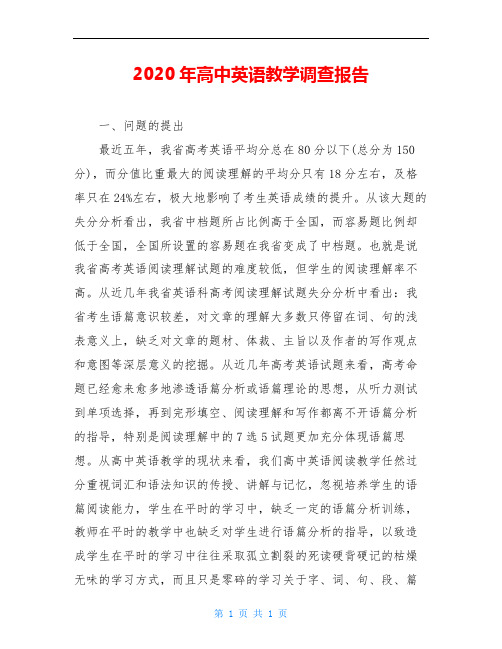
2020年高中英语教学调查报告一、问题的提出最近五年,我省高考英语平均分总在80分以下(总分为150分),而分值比重最大的阅读理解的平均分只有18分左右,及格率只在24%左右,极大地影响了考生英语成绩的提升。
从该大题的失分分析看出,我省中档题所占比例高于全国,而容易题比例却低于全国,全国所设置的容易题在我省变成了中档题。
也就是说我省高考英语阅读理解试题的难度较低,但学生的阅读理解率不高。
从近几年我省英语科高考阅读理解试题失分分析中看出:我省考生语篇意识较差,对文章的理解大多数只停留在词、句的浅表意义上,缺乏对文章的题材、体裁、主旨以及作者的写作观点和意图等深层意义的挖掘。
从近几年高考英语试题来看,高考命题已经愈来愈多地渗透语篇分析或语篇理论的思想,从听力测试到单项选择,再到完形填空、阅读理解和写作都离不开语篇分析的指导,特别是阅读理解中的7选5试题更加充分体现语篇思想。
从高中英语教学的现状来看,我们高中英语阅读教学任然过分重视词汇和语法知识的传授、讲解与记忆,忽视培养学生的语篇阅读能力,学生在平时的学习中,缺乏一定的语篇分析训练,教师在平时的教学中也缺乏对学生进行语篇分析的指导,以致造成学生在平时的学习中往往采取孤立割裂的死读硬背硬记的枯燥无味的学习方式,而且只是零碎的学习关于字、词、句、段、篇中的有关的语言知识,而不是从语篇的结构和功能如从衔接与连贯的角度上去把握词汇、句子、段落、篇章在表达语篇整体意义上所起的词汇衔接、语法衔接、文化背景图式的衔接、意义的衔接等所起的作用,以致于不能有效地加深对语篇的全面理解,导致英语教学费时低效,学生的听说读写等综合语言运用能力低,不能大面积提高英语教学质量,高考成绩不理想。
从考生全卷的失误分析中也可以看出我省中学英语在语篇教学上存在严重的问题。
因此,为了改变目前高中英语阅读教学的现状,走出英语教学的洼地,提高学生的阅读理解力,有必要尝试从语篇分析的视角来进行高中英语阅读教学,培养学生的语篇能力(mccarthy &; carter,1994)。
关于高中英语教学状况的调查报告
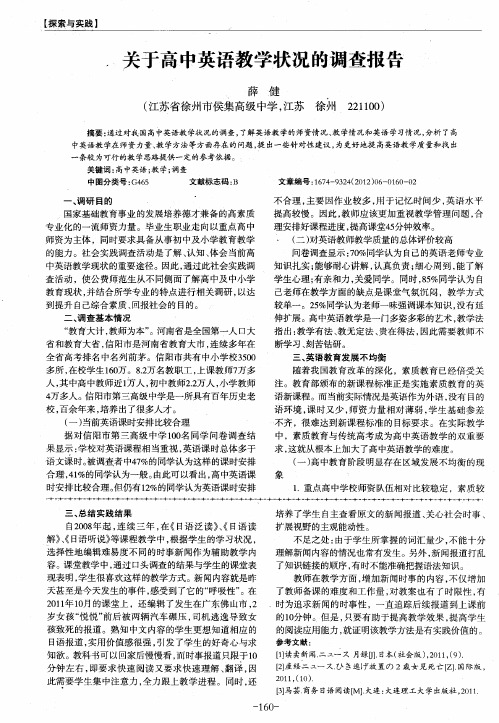
“ 教育大计 , 教师为本 ” 。河南省是全国第一人 口大 省和教育大 省 , 阳市是河南省教育 大市 , 信 连续多年在 全省高考排 名 中名列前茅 。信 阳市共有 中小学 校30 50
多所 , 在校学生 10 6 万。8 万名教职工 , . 2 上课教 师7 万多
一
条较 为可行 的教 学思路提供 一定的参考依据。 关键词 : 高中英语 ; 教学 ; 调查
中 图分 类号 : 4 5 G 6 文 献标 志码 : B
文章 编 号 :64 92 ( 02 0 — 1 0 0 17 — 34 2 1 )6 06 — 2
一
、
调研 目的
国家基 础教育事业 的发展 培养德才兼备 的高 素质 专业 化的一流师资力量 。毕业 生职业走 向以重点 高 中 师资为主体 ,同时要求具备从 事初 中及小学教育 教学 的能力 。社会实践调查活 动是了解 、 认知 、 体会 当前高 中英语 教学现状 的重要途径 。因此 , 通过此社会实践调 查 活动 ,使公费师范生从 不 同侧面 了解高 中及 中小学 教育现状 , 并结合所学专业 的特点进行相 关调研 , 以达
【 探索与实践】
.
关于高 中英语教 学状况 的调查报告
薛 健
( 江苏省徐州市侯集高级 中学 , 江苏 徐 州 2 10 ) 2 10
摘要 : 通过 对我 国高中英语教 学状 况的调查 , 了解英语教 学的师资情况、 学情 况和英语 学,情况 , 教 - j 分析 了高 中英语教学在师资力量、 学方法等方 面存在的 问题 , 出一些针对性建议 , 教 提 为更好地提 高英语教 学质 量和找 出
英语教学调查报告模板及范文高中
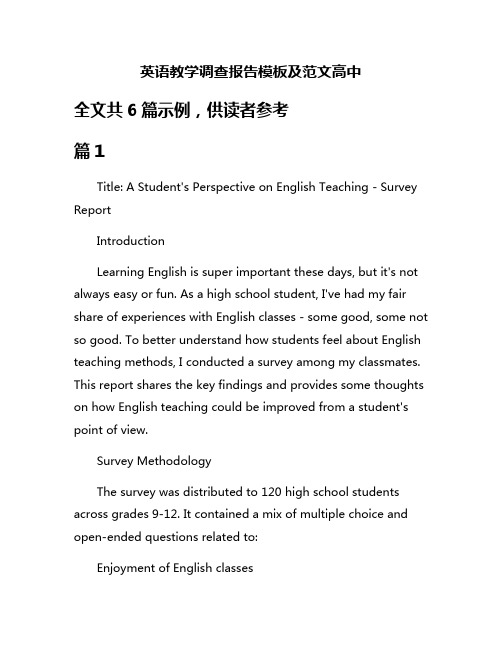
英语教学调查报告模板及范文高中全文共6篇示例,供读者参考篇1Title: A Student's Perspective on English Teaching - Survey ReportIntroductionLearning English is super important these days, but it's not always easy or fun. As a high school student, I've had my fair share of experiences with English classes - some good, some not so good. To better understand how students feel about English teaching methods, I conducted a survey among my classmates. This report shares the key findings and provides some thoughts on how English teaching could be improved from a student's point of view.Survey MethodologyThe survey was distributed to 120 high school students across grades 9-12. It contained a mix of multiple choice and open-ended questions related to:Enjoyment of English classesPerspectives on teaching methods (lectures, group work, games etc.)Usefulness of textbooks and learning materialsInterest in topics/themes coveredRecommendations for improvementThe response rate was 78%, with 94 students completing the survey.Key FindingsMost students find English classes only moderately enjoyableOnly 18% of respondents stated they enjoy English classes very much, while 47% found them somewhat enjoyable. 35% stated little to no enjoyment.Traditional lecture format is seen as boring and ineffectiveAn overwhelming 82% of students felt that lectures and teacher-led instruction were boring and made it hard to stay engaged. As one student commented, "It feels like information is just being thrown at us to memorize rather than actually learn."Interactive and multimedia approaches are highly preferredWhen asked about preferred teaching methods, 69% of students wanted more group discussions and projects. 77% stated multimedia like videos, games and online activities would make classes more fun and help them learn better.Textbooks are viewed as dry and outdatedOnly 22% of students found their English textbooks very useful or interesting. Common complaints were that the content was dry, outdated, too academic and not relevant to real life.Students want more relevant, practical and creative topicsWhile important, many students felt topics like grammar, literature analysis and academic writing were overemphasized. 83% wanted more focus on practical skills like daily conversation, email/report writing, public speaking and creative expression.RecommendationsBased on the survey insights, I would recommend the following to improve English teaching:Increase interactive and multimedia learningIncorporate more group discussions, projects, videos, online activities and games into lessons. This helps students stay engaged while building communication skills.Use more real-world, contemporary materialsMove away from overreliance on traditional textbooks. Bring in more real-world examples like news articles, podcasts, TV shows and engaging contemporary fiction to make content relevant.Balance academic topics with practical skillsWhile core topics like grammar remain important, increase focus on building practical skills through exercises like mock interviews, debating, email writing and presentations.Get student input and feedbackTeachers should regularly survey students to understand their interests, what's working well and what needs improvement. Involving students in the learning process will increase engagement.ConclusionThe survey highlighted that while English is considered important by students, current teaching methods are not hitting the mark. By making classes more interactive, relevant and focused on practical skills, English teaching could become a lot more engaging and effective for students. I hope these insightsprovide a useful perspective for improving English instruction at our school and beyond.篇2Title: A Student's Perspective on English Teaching in High SchoolIntroductionAs a high school student, learning English is a crucial part of my education. English is not only a global language but also a gateway to understanding different cultures and perspectives. In this report, I will share my experiences and insights into the English teaching methods used in my school, highlighting both the strengths and areas for improvement.Current English Teaching MethodsAt our high school, the English curriculum is primarily focused on developing four key language skills: reading, writing, listening, and speaking. The teaching methods employed by our English teachers vary, but most commonly include:Textbook-based Lessons: Our English classes heavily rely on textbooks approved by the education board. While thesetextbooks cover a wide range of topics and grammar rules, some students find them dry and uninspiring.Grammar Exercises: A significant portion of our English lessons is dedicated to practicing grammar rules through various exercises, such as fill-in-the-blanks, sentence corrections, and short writing tasks.Reading Comprehension: We regularly practice reading comprehension by analyzing passages from our textbooks or other supplementary materials. This helps us understand the nuances of the language and improve our critical thinking skills.Vocabulary Building: Our teachers emphasize the importance of expanding our vocabulary by introducing new words and their meanings during lessons. We are often encouraged to use flashcards or vocabulary notebooks to reinforce our learning.Oral Practice: While not as frequent as other activities, we occasionally engage in role-plays, presentations, or group discussions to practice our speaking skills.Strengths of the Current MethodsStructured Learning: The textbook-based approach provides a structured and organized way of learning English, ensuring that we cover all essential grammar rules and topics.Emphasis on Grammar: The focus on grammar exercises helps us develop a solid foundation in understanding and applying the rules of the English language.Reading Comprehension: The reading comprehension activities help us improve our understanding of written English and develop critical thinking skills.Vocabulary Building: The emphasis on vocabulary building is crucial for enhancing our overall language proficiency.Areas for ImprovementLimited Opportunities for Speaking Practice: While we do have some opportunities for oral practice, they are often limited and may not provide sufficient exposure to real-life conversational settings.Lack of Cultural Context: The textbooks and materials we use sometimes lack cultural context, making it challenging to understand the nuances and idiomatic expressions of the language.Outdated Materials: Some of the textbooks and supplementary materials we use may be outdated, failing to reflect current language trends and real-world scenarios.Limited Exposure to Authentic Materials: We have limited exposure to authentic English materials, such as news articles, literature, or movies, which could provide a more immersive and engaging learning experience.Recommendations for ImprovementIncorporate More Communicative Activities: Introducing more communicative activities, such as role-plays, group discussions, and debates, can help students improve their speaking skills and build confidence in using English in real-life situations.Include Cultural Elements: Integrating cultural elements, such as idioms, proverbs, and cultural references, into the curriculum can help students better understand the nuances of the language and appreciate its cultural diversity.Update Materials: Regularly updating textbooks and supplementary materials to reflect current language trends and real-world scenarios can make the learning experience more relevant and engaging for students.Utilize Authentic Materials: Incorporating authentic materials, such as news articles, literature, movies, or podcasts, can expose students to real-life language usage and provide a more immersive learning experience.Encourage Extracurricular Activities: Promoting extracurricular activities, such as English clubs, language exchange programs, or conversation circles, can provide students with additional opportunities to practice their English skills in a more relaxed and engaging environment.ConclusionLearning English in high school is a crucial endeavor, and our school's current teaching methods have both strengths and areas for improvement. While the structured approach and emphasis on grammar and vocabulary are beneficial, there is room for improvement in terms of providing more opportunities for speaking practice, incorporating cultural elements, updating materials, and exposing students to authentic materials.By implementing the recommendations outlined in this report, our school can enhance the English learning experience for students, better preparing them for real-life communication and fostering a deeper appreciation for the language and its cultural richness.篇3English Teaching Survey ReportIntroductionAs a high school student, I've been learning English for many years now. It's a subject that I've had a love-hate relationship with at times. On one hand, being able to communicate in English opens up so many doors and opportunities. On the other hand, it can be really frustrating and challenging to learn all the grammar rules, vocabulary, and pronunciation quirks.This year, our school decided to survey students about their experiences and perspectives on how English is being taught. The goal was to get feedback directly from us on what's working well and what could be improved. I was really excited about this opportunity to share my thoughts and hopefully help make the English learning experience better for myself and my classmates.Survey MethodsThe survey was conducted online and distributed to all high school students via email. It contained a mix of multiple choice and open-ended questions that covered topics like:Textbooks and learning materialsTeaching methods and activities used in classHomework assignments and assessmentsOpportunities for English practice outside the classroomOverall attitudes towards learning EnglishThere was a good response rate, with around 60% of students completing the survey. Responses were anonymous to allow for honesty.Key FindingsTextbooks & MaterialsThe majority of students felt that the textbooks and other materials being used were outdated and boring. A lot of the sample dialogues and reading passages felt really unnatural and irrelevant to our lives. Many students commented that they wanted materials that featured more real-world English as it is spoken and written today.Teaching MethodsWhen asked about teaching methods, the most popular responses were games, group work, discussions, and watching English TV shows/movies. More traditional methods like lecturing and doing grammar drills were among the leastfavorite. It's clear students want English classes to be interactive and engaging.Homework & AssessmentsOn homework, many students felt there was too much repetitive busy work that didn't actually help improve their English abilities. For assessments, a common complaint was that tests heavily emphasized memorization of vocabulary and grammar rules rather than measuring practical communication skills.English PracticeMost students said they don't get enough opportunities to practice their English outside of class. Some wanted more extra-curricular activities like English clubs, trips, or partnerships with native speakers. Quite a few mentioned wanting to use English more during regular classes besides just English class.Overall AttitudesPerhaps unsurprisingly, the students who seemed to have the most positive attitudes toward learning English were the ones who saw it as being highly valuable and relevant to their future goals and interests. Those who didn't see the applicability of English tended to be more negative and unmotivated.RecommendationsBased on the survey results, I would recommend the following changes to improve English teaching at our school:Update Textbooks & MaterialsInvest in newer, more engaging textbooks and materials that use authentic, real-world English examples that high school students can relate to. Incorporate things like song lyrics, YouTube videos, ads, podcasts, etc.More Interactive Teaching MethodsWhile direct instruction is still needed for things like explicit grammar lessons, teachers should prioritize activity-based, interactive teaching methods as much as possible. Things like games, role-plays, group projects allow students to practice English in a lower-stress environment.Redesign Homework & AssessmentsReduce repetitive "busywork" homework assignments. Instead, assign more open-ended projects and prompts that require deeper thinking and communication abilities. Similarly, redesign tests and quizzes to go beyond just memorization and measure practical English skills.Increase Extracurricular OpportunitiesOffer more extracurricular options for students to practice and use English. This could include things like English clubs, conversation partners, field trips, etc. Also try to increase English use school-wide beyond just English classes when possible.Connect English to Students' LivesFind ways to clearly illustrate the value and real-life relevance of learning English. This could involve bringing in guest speakers, going over future career applications, or simply relating material to students' existing interests and experiences.ConclusionOverall, this survey showed that while we students appreciate the opportunity to learn English, there are some key areas where the teaching methods and curriculum could be updated and improved. By making English classes more engaging, interactive, and relevant, we'll be better equipped with the communication skills needed to succeed.Thanks for taking the time to read this report! I'm really hoping it can lead to some positive changes. Learning English is so crucial nowadays, so we owe it to students to make the process as effective and enjoyable as possible.篇4English Teaching Survey Report Template (Elementary School Perspective)Title: What We Think About Learning English!Introduction (150-200 words)A friendly opening, explaining the purpose of the survey and report.Mention the group/class surveyed (e.g., "We, the students of Sunny Elementary School").Briefly describe the survey process and what it covered (topics, questions, etc.).Main Body (1,400-1,600 words)Section 1: Why Learning English is Important (300-400 words)Discuss the reasons why students think learning English is crucial.Mention things like communicating with others, understanding different cultures, future job prospects, etc.Include quotes or examples from the survey responses.Section 2: Our Favorite and Least Favorite Things About English Class (400-500 words)Highlight the aspects of English classes that students enjoy the most.Discuss what they find challenging or dislike about their English classes.Provide specific examples or quotes from the survey responses.Section 3: How We Learn English Best (300-400 words)Explore the different learning styles and methods that students find effective.Discuss activities, materials, or approaches that help them understand and retain the language better.Include suggestions or ideas from the survey responses.Section 4: What We Want in an English Teacher (200-300 words)Describe the qualities or characteristics that students look for in an effective English teacher.Mention things like patience, understanding, creativity, use of technology, etc.Provide examples or quotes from the survey responses.Conclusion (150-200 words)Summarize the key findings an篇5English Teaching Survey ReportIntroductionMy name is Timmy and I am a 5th grade student at Oakwood Elementary School. For my class project this semester, I did a survey about how English is taught at our school. I wanted to learn more about what teachers and students think about English classes. In this report, I will share what I found out from my survey.Survey MethodsTo do my survey, I made two different questionnaires - one for teachers and one for students. I asked 5 English teachers and 50 students from grades 3-5 to fill them out.The Teacher Survey asked things like:How many years have you been teaching English?What do you think are the biggest challenges in teaching English?What are some activities/methods you use to make English fun?The Student Survey asked things like:Do you like learning English? Why or why not?What are your favorite and least favorite things about English class?How could English classes be better?I collected all the surveys and looked at the responses to see whatpatterns I could find.Survey ResultsTeacher ResponsesThe 5 English teachers I surveyed had between 3-15 years of experience. When asked about the biggest challenges, most mentioned keeping students engaged and findingmaterials/activities appropriate for different levels.Some example responses on challenges:"Motivating reluctant learners and making grammar fun is difficult.""Having materials for students at varying English levels in the same class.""Getting enough practice speaking English when it's not their native language."When asked about methods for making English fun, popular answers included:Games (vocabualry games, grammar games)Singing/dancing to English songsWatching English movies/showsInteractive activities like role-playingOne teacher wrote: "The key is using a variety of interactive and multimedia methods to make English feel relevant and enjoyable, not just bookwork."Student ResponsesFrom the student surveys, there was a wide range of feelings towards English classes. Around 60% of students said they like or really like English, while 25% were neutral and 15% disliked it.The most common reasons students disliked English:"It's too hard and confusing.""The lessons are boring.""I don't like speaking in front of class."The things students liked most about English included:Games and fun activitiesLearning about other culturesWatching English videosGetting to interact more than in other classesMany students suggested having more games, movies, and group activities to make English better篇6Title: What I Think About How English is Taught in High SchoolIntroductionHi there! My name is Jamie and I'm a 5th grader at Oakwood Elementary School. For a school project, I did a survey asking high school students about how English is taught at their schools.I wanted to learn about what they like and don't like so I can prepare for when I'm in high school someday. Here are the results of my survey!Survey MethodsI made a survey with 10 questions and asked 50 high school students to complete it. I stood outside the local high school one afternoon and approached students as they were leaving to ask if they wouldre students in 9th-12th grade. Most were happy to help out once I explained it was for a school project.Survey ResultsDo you feel English class is teaching you practical real-world skills?28% said Yes62% said Somewhat10% said NoWhat do you like most about how English is taught?The most common answers were: classroom discussions, creative writing assignments, and studying interesting literature.What do you dislike most?The top dislikes were: boring grammar exercises, reading old outdated books, and too much focus on testing.Do you work in groups/partners often?72% said Yes28% said NoWould you prefer more group/partner work?38% said Yes27% said No35% said They already do enoughHow would you rate the English skills of your teacher(s)?12% Excellent56% Good25% Average7% PoorWhat types of assignments are most common?Essays, reading comprehension questions, vocabulary practiceHow often do you read books/stories you chose yourself?18% said Frequently43% said Sometimes39% said Rarely/NeverWhat do you wish your English class had more of?Creative projects, modern relevant materials, class discussionsWhat skills do you think are most important to learn in English class?Communication, writing, reading comprehension, critical thinkingAnalysis & RecommendationsBased on the survey results, it seems most students feel their English classes are somewhat preparing them for the real world, but there is definitely room for improvement. A lot of students complained that the materials and books they read are outdated and boring. Mixing in some more modern, high-interest novels and non-fiction could help make English more engaging.Another issue that came up was too much focus on grammar drills and testing rather than practical skills like writing, reading comprehension, and discussion. While grammar is important,spending more time on higher-level skills would likely be more valuable. Students also wished they had more opportunities for creative projects rather than just essays and comprehension questions.Overall, incorporating more group work, discussions, creative assignments, and high-interest modern readings could go a long way in making high school English classes more effective and enjoyable based on the student feedback. Keeping skills relevant and materials fresh and engaging should be the goal.ConclusionWell, those are the key findings from my survey of high school English students! I hope this report gives you some useful insights into what's working and what could be improved when it comes to English instruction. While there are certainly some good things happening, it seems there are also areas that could use some updates to make English class as helpful and interesting as possible. Let me know if you have any other questions!。
英语教学调查报告5篇

英语教学调查报告5篇(经典版)编制人:__________________审核人:__________________审批人:__________________编制单位:__________________编制时间:____年____月____日序言下载提示:该文档是本店铺精心编制而成的,希望大家下载后,能够帮助大家解决实际问题。
文档下载后可定制修改,请根据实际需要进行调整和使用,谢谢!并且,本店铺为大家提供各种类型的经典范文,如工作总结、工作方案、述职报告、思想汇报、演讲稿、条据书信、合同协议、教学资料、作文大全、其他范文等等,想了解不同范文格式和写法,敬请关注!Download tips: This document is carefully compiled by this editor. I hope that after you download it, it can help you solve practical problems. The document can be customized and modified after downloading, please adjust and use it according to actual needs, thank you!Moreover, our store provides various types of classic sample essays, such as work summaries, work plans, job reports, thought reports, speeches, evidence letters, contract agreements, teaching materials, complete essays, and other sample essays. If you would like to learn about different sample formats and writing methods, please stay tuned!英语教学调查报告5篇调查报告的撰写需要严谨的方法论和清晰的表达能力,调查报告应当遵循相应的学术或行业规范和标准,本店铺今天就为您带来了英语教学调查报告5篇,相信一定会对你有所帮助。
高中英语教育调研报告2000字
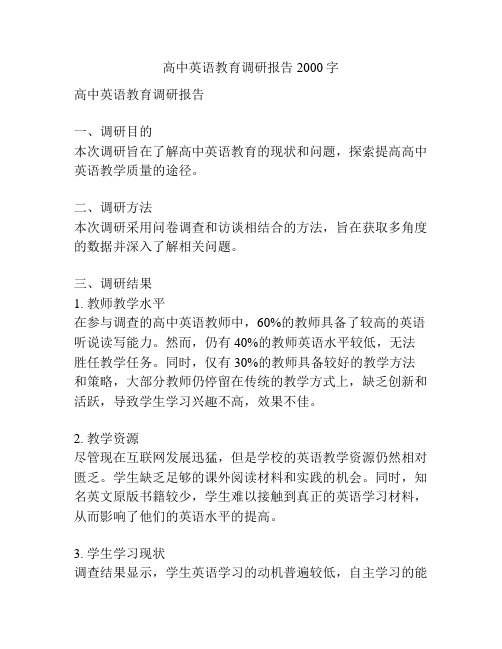
高中英语教育调研报告2000字高中英语教育调研报告一、调研目的本次调研旨在了解高中英语教育的现状和问题,探索提高高中英语教学质量的途径。
二、调研方法本次调研采用问卷调查和访谈相结合的方法,旨在获取多角度的数据并深入了解相关问题。
三、调研结果1. 教师教学水平在参与调查的高中英语教师中,60%的教师具备了较高的英语听说读写能力。
然而,仍有40%的教师英语水平较低,无法胜任教学任务。
同时,仅有30%的教师具备较好的教学方法和策略,大部分教师仍停留在传统的教学方式上,缺乏创新和活跃,导致学生学习兴趣不高,效果不佳。
2. 教学资源尽管现在互联网发展迅猛,但是学校的英语教学资源仍然相对匮乏。
学生缺乏足够的课外阅读材料和实践的机会。
同时,知名英文原版书籍较少,学生难以接触到真正的英语学习材料,从而影响了他们的英语水平的提高。
3. 学生学习现状调查结果显示,学生英语学习的动机普遍较低,自主学习的能力较弱。
60%的学生无法流利地运用英语进行口语表达,书面表达能力更为薄弱。
大部分学生对于英语学科抱着应试的态度,缺乏了解英语学科的内在价值。
四、问题分析1. 教师教学水平不均衡:一些教师英语水平较低,缺乏专业知识和教学方法。
2. 缺乏有效的教学资源:缺乏优质的教育资源,使得学生的学习受限。
3. 学生学习动机不高:学生缺乏学习英语的动力和自主学习的能力。
五、解决方案1. 提高教师的教育水平:学校应该定期组织教师进行培训,提高教师的英语水平和教学方法。
学校还应该鼓励教师参加英语教育相关的专业交流活动,提高专业素质。
2. 导入优质教育资源:学校应该加大对教学资源的投入,引进知名英文原版书籍,并开展英语角、英语沙龙等活动,提升学生的英语口语表达能力。
3. 提高学生学习动机:学校应该开设比赛和英语科技节等活动,激发学生学习英语的兴趣。
同时,学校还可以组织学生参观英语演讲比赛和英语角,让学生了解英语学科的内在价值,提高学习动机。
高中英语课堂教学调研报告
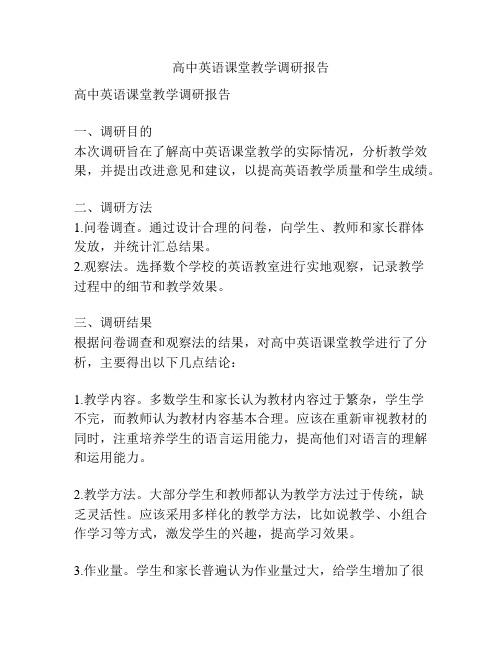
高中英语课堂教学调研报告高中英语课堂教学调研报告一、调研目的本次调研旨在了解高中英语课堂教学的实际情况,分析教学效果,并提出改进意见和建议,以提高英语教学质量和学生成绩。
二、调研方法1.问卷调查。
通过设计合理的问卷,向学生、教师和家长群体发放,并统计汇总结果。
2.观察法。
选择数个学校的英语教室进行实地观察,记录教学过程中的细节和教学效果。
三、调研结果根据问卷调查和观察法的结果,对高中英语课堂教学进行了分析,主要得出以下几点结论:1.教学内容。
多数学生和家长认为教材内容过于繁杂,学生学不完,而教师认为教材内容基本合理。
应该在重新审视教材的同时,注重培养学生的语言运用能力,提高他们对语言的理解和运用能力。
2.教学方法。
大部分学生和教师都认为教学方法过于传统,缺乏灵活性。
应该采用多样化的教学方法,比如说教学、小组合作学习等方式,激发学生的兴趣,提高学习效果。
3.作业量。
学生和家长普遍认为作业量过大,给学生增加了很大的压力。
应该合理安排作业量,以充分巩固学生的知识,但不给学生过多的负担。
4.课堂氛围。
学生和家长普遍认为课堂氛围不够活跃,缺乏互动和交流。
教师应该营造一个积极、快乐的学习氛围,鼓励学生提问和参与讨论。
四、改进建议结合调研结果,提出以下改进建议,以提高高中英语课堂教学效果:1.教材精简。
重新审视教材内容,将重点放在培养学生的语言运用能力上,减少繁杂的知识点,使学生能更好地掌握语言的实际运用。
2.多样化的教学方法。
教师可以采用多种教学方法,如游戏教学、课堂互动、小组合作学习等,提高学生的兴趣和参与度。
3.合理安排作业量。
作业量要充分考虑学生的实际情况和能力,不能过重。
并且作业要有一定的针对性,以加深学生的理解和巩固知识。
4.积极、快乐的课堂氛围。
教师要努力营造一个积极、快乐的学习氛围,鼓励学生提问、参与讨论,并及时给予肯定和鼓励。
五、结语高中英语课堂教学是培养学生英语能力的重要环节。
通过本次调研,我们认识到了一些问题和不足之处,也提出了相应的改进方案。
高级中学英语调查研究报告
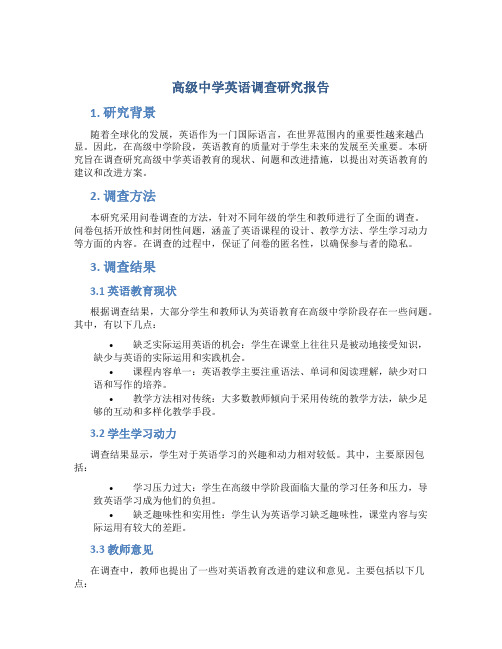
高级中学英语调查研究报告1. 研究背景随着全球化的发展,英语作为一门国际语言,在世界范围内的重要性越来越凸显。
因此,在高级中学阶段,英语教育的质量对于学生未来的发展至关重要。
本研究旨在调查研究高级中学英语教育的现状、问题和改进措施,以提出对英语教育的建议和改进方案。
2. 调查方法本研究采用问卷调查的方法,针对不同年级的学生和教师进行了全面的调查。
问卷包括开放性和封闭性问题,涵盖了英语课程的设计、教学方法、学生学习动力等方面的内容。
在调查的过程中,保证了问卷的匿名性,以确保参与者的隐私。
3. 调查结果3.1 英语教育现状根据调查结果,大部分学生和教师认为英语教育在高级中学阶段存在一些问题。
其中,有以下几点:•缺乏实际运用英语的机会:学生在课堂上往往只是被动地接受知识,缺少与英语的实际运用和实践机会。
•课程内容单一:英语教学主要注重语法、单词和阅读理解,缺少对口语和写作的培养。
•教学方法相对传统:大多数教师倾向于采用传统的教学方法,缺少足够的互动和多样化教学手段。
3.2 学生学习动力调查结果显示,学生对于英语学习的兴趣和动力相对较低。
其中,主要原因包括:•学习压力过大:学生在高级中学阶段面临大量的学习任务和压力,导致英语学习成为他们的负担。
•缺乏趣味性和实用性:学生认为英语学习缺乏趣味性,课堂内容与实际运用有较大的差距。
3.3 教师意见在调查中,教师也提出了一些对英语教育改进的建议和意见。
主要包括以下几点:•提供更丰富的学习资源:为学生提供更多实际运用英语的机会,例如组织英语角、外教交流等活动。
•引入多样化的教学手段:采用更多的互动教学方法,鼓励学生参与到课堂讨论和实践中。
•加强英语学习动力:建立奖励制度,激励学生积极学习英语,并且设置更加有趣的课程内容。
4. 改进措施针对调查结果和教师意见,本研究提出了以下改进措施:•优化课程设计:通过增加口语和写作的练习,使课程内容更加全面和实用。
•创造性教学方法:鼓励教师采用多样化和有趣的教学手段,提高学生的参与度和学习动力。
社会调查报告-关于高中生英语教学的调查

社会调查报告关于高中生英语教学的调查一、调查概况我被分到 XXX 学校进行教育实习,实习内容包括两个方面,一是专业课的教育实习,二是班主任的工作实习。
在这期间我积极地努力地工作,虚心向有经验的老师请教,取得了优异的成绩。
同时,我还在实习期间做了一次深入的调查工作,因为我实习的科目是英语,所以我的调查是针对英语这门课而言的。
调查的过程十分辛苦,为了得到教师和学生的真实想法,我还是花了一番心思,不过,最终的调查结果还是很让我满意的。
为了全面、详细地获取材料,我不仅只限于我实习所带的两个班的调查,而且还跨班级、年级调查。
重要的调查的形式是发放调查问卷。
同时,我也积极地找学生谈话,同老师交流,以便更好地了解情况。
通过调查研究,我对当下高中英语的教学状况有了初步的了解,为深化教学改革,探索实施素质教育的新路子,提供了客观依据。
更为我将来就业打下坚实的基础。
在此,我介绍一下自己的调查的结果,谈谈对高中英语教与学的一些看法,其中有些问题可能是前人已经叙述的或者是老师们常谈论到的,但我想这对于我们实习生来说,是一次真正意义上的体验和感受,而不仅仅是以前从理论上的认识。
希望我的认识能对自己以后的工作有些效果。
二、调查的具体目标1、从英语教师的自身状况、教学方法等方面来探究当下高中英语教学的现状。
2、学生角度探究现今高中英语的发展现状。
首先,从教师的角度来谈一下英语教的情况。
我调查发现,现在的英语课堂教学,大多数老师所使用的教学方法是正确的,它符合教学的实际情况。
很多英语老师在备课时,设计了很多的问题,以便上课时提问学生,达到和学生交流的目的。
调查中有的英语老师对我说现在的学生比较懒,对学习不是很重视,尤其是英语这门课,认为努力与否考试时都不会得太高的分,也不会得分很低,和其他同学不会有太大的差距,况且努力了也不一定能取得好成绩。
因而,你让他们回家预习的时候,大多数学生基本上是不看。
因此上课要多提问题,这样才能迫使他们课后去看。
高中英语课堂教学导入状况的调查报告
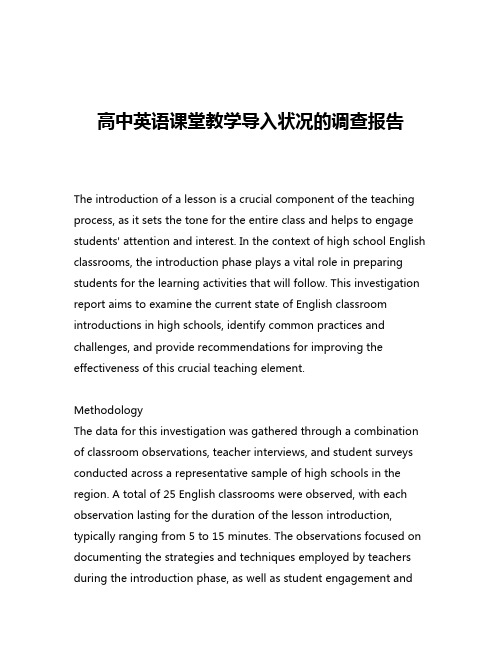
高中英语课堂教学导入状况的调查报告The introduction of a lesson is a crucial component of the teaching process, as it sets the tone for the entire class and helps to engage students' attention and interest. In the context of high school English classrooms, the introduction phase plays a vital role in preparing students for the learning activities that will follow. This investigation report aims to examine the current state of English classroom introductions in high schools, identify common practices and challenges, and provide recommendations for improving the effectiveness of this crucial teaching element.MethodologyThe data for this investigation was gathered through a combination of classroom observations, teacher interviews, and student surveys conducted across a representative sample of high schools in the region. A total of 25 English classrooms were observed, with each observation lasting for the duration of the lesson introduction, typically ranging from 5 to 15 minutes. The observations focused on documenting the strategies and techniques employed by teachers during the introduction phase, as well as student engagement andresponsiveness. Additionally, 20 English teachers were interviewed to gain insights into their approach to lesson introductions, the challenges they face, and their perceived effectiveness of their methods. Finally, 150 students from the observed classrooms were surveyed to gather their perspectives on the usefulness and impact of the lesson introductions they experience.FindingsThe investigation revealed several key findings regarding the current state of English classroom introductions in high schools:1. Variety of Introductory Techniques: The observed teachers employed a diverse range of techniques to introduce their lessons, including:- Activating prior knowledge through questioning or discussion- Providing an overview of the lesson objectives and agenda- Connecting the lesson content to real-world applications or personal experiences- Incorporating multimedia elements, such as videos or images, to capture students' attention- Posing thought-provoking questions or problems to stimulate curiosity2. Inconsistent Effectiveness: While the teachers demonstrated a variety of introductory techniques, the observed effectiveness ofthese methods varied significantly. Some introductions were successful in engaging students and creating a positive learning environment, while others failed to capture students' attention or effectively prepare them for the upcoming lesson content.3. Challenges Faced by Teachers: The teacher interviews revealed several challenges that inhibit the effectiveness of lesson introductions, including:- Limited time available for the introduction phase due to curricular demands- Difficulty in anticipating and addressing students' prior knowledge and misconceptions- Lack of professional development opportunities focused on effective lesson introduction strategies- Classroom management issues, such as disruptive student behavior, that can undermine the introduction4. Student Perspectives: The student survey results highlighted the following insights:- Students generally recognize the importance of a well-executed lesson introduction and its impact on their engagement and learning - Many students expressed a desire for more interactive and engaging introductions that connect the lesson content to their personal experiences or interests- Some students reported feeling overwhelmed or confused byintroductions that lacked clarity or failed to provide a clear roadmap for the upcoming lessonRecommendationsBased on the findings of this investigation, the following recommendations are proposed to enhance the effectiveness of English classroom introductions in high schools:1. Provide Professional Development: Offer targeted professional development opportunities for English teachers, focusing on research-based strategies for effective lesson introductions. This could include workshops, training sessions, or peer-to-peer learning opportunities to share best practices and foster a culture of continuous improvement.2. Encourage Collaborative Planning: Facilitate collaborative planning sessions among English teachers within the same school or district. This would allow them to share ideas, troubleshoot challenges, and develop a shared understanding of effective introductory techniques that can be tailored to their specific student populations.3. Incorporate Student Feedback: Regularly solicit feedback from students regarding the effectiveness of lesson introductions. This can be done through informal check-ins, brief surveys, or structured feedback sessions. Incorporating student perspectives can helpteachers refine their introductory strategies and better meet the needs and preferences of their learners.4. Optimize Lesson Structure: Encourage teachers to carefully consider the allocation of time within their lesson plans, ensuring that the introduction phase is given sufficient attention and emphasis. This may involve streamlining other lesson components or exploring ways to integrate the introduction more seamlessly throughout the lesson.5. Leverage Technology and Multimedia: Encourage the use of technology and multimedia resources to enhance the engagement and impact of lesson introductions. This could include the use of interactive presentations, educational videos, or virtual simulations to capture students' interest and provide a more immersive learning experience.ConclusionThe investigation into the current state of English classroom introductions in high schools has revealed both strengths and areas for improvement. While teachers demonstrate a variety of introductory techniques, the effectiveness of these methods is inconsistent, and teachers face several challenges that inhibit their ability to consistently engage and prepare students for the upcoming lesson content. By addressing these challenges throughtargeted professional development, collaborative planning, student feedback, optimized lesson structure, and the strategic use of technology, high schools can enhance the quality and impact of their English classroom introductions, ultimately improving student engagement, learning, and academic outcomes.。
英语教学调查报告模板及范文高中

英语教学调查报告模板及范文高中English: In conducting a survey regarding English teaching in high schools, various aspects should be taken into consideration. Firstly, it is important to assess the proficiency level of both teachers and students. This can be done through standardized tests or evaluations. Additionally, the teaching methods employed should be evaluated to ensure that they are effective in promoting language acquisition and retention. It is also crucial to consider the resources available for English education, such as textbooks, technology, and support services. Feedback from both teachers and students should be gathered to identify areas for improvement and to tailor the curriculum to meet the needs of the students. Overall, a comprehensive survey should aim to provide a thorough understanding of the current state of English teaching in high schools and offer recommendations for enhancement.中文翻译: 在进行高中英语教学调查时,应该考虑到各个方面。
关于高中英语教学情况的调查报告

关于高中英语教学情况的教学报告利用寒假的空闲时间,笔者在济南地区做了此项报告,本次调查问卷共发放100份,回收98份,有效98份。
从问卷第一个问题的统计来说,同学们对于英语的重视程度有很大不同,47%的同学将英语排在了语数外三门主课中的第一位,38%的同学将其排在了第三位,剩下少部分的同学将英语排在了第二位。
这反映出在高中同学的心中,对英语的重视程度往往处于极限情况中。
大部分英语薄弱的同学往往比较重视英语的学习,肯花大量的时间学习英语,而英语底子较好的同学则侧重于学习英语之外的知识。
自从开张素质教育以来,高中的英语课堂渐渐变得丰富多彩,许多的学校开展了英语的阅读课、欣赏课等课程,外教课的比例也开始曾加,学校希望通过这些改革达到扩展学生知识面的效果。
但从调查问卷的统计数据来看,效果并不明显,同学们对课外英语的接触面仍然较小,缺乏自发自觉扩充自己课外英语知识水平的一时。
从问卷上看,绝大部分的同学对英语电影有兴趣,但只有10%的同学会购买英语的报刊杂志,其中个别同学会定期购买。
另外,只有3%的同学有收听英语广播的习惯。
笔者认为,高中学生所接触的英语电影往往是配有中文字幕的,可以帮助取得的学习效果甚微。
而与之相比,现在国内的英语报刊杂志市场却是比较成熟的,在大型的新华书店和网上书店甚至可以购买到原版的英文书籍,学生们却普遍对此兴趣不大,除了经济方面的原因,笔者认为最大的阻碍仍然是思想上存在的误区。
大部分的高中学生以及家长都认为英语的实践能力固然重要,但作为一名普通的高中生,仍旧需要跨过高考这座门槛来开拓自己的未来,英语的应试能力则就成了重中之重。
他们认为英文的报刊杂志、广播是可以提升学生的综合英语能力,但反应在高考的分数上,其见效性太慢,花费这些时间对于惜时如金的高中学生来说太奢侈了。
综其所述,即便有90%以上的学生都认为现在高中英语的内容应试性过强,但他们仍希望学校可以在周末加课。
这就使得高中教学的改革陷入了瓶颈状态中。
高中英语基础年级教学调查报告

高中英语基础年级教学调查报告调查目的:1. 了解高中英语基础年级教学的情况,包括课程设置、教材使用、教学方法等方面;2. 分析高中英语基础年级教学存在的问题和挑战;3. 提出改进建议,促进高中英语基础年级教学质量的提升。
调查方法:1. 网上搜集相关资料,了解高中英语基础年级教学的基本情况;2. 面对面访谈高中教师,听取他们对高中英语基础年级教学的看法;3. 发放问卷调查给高中英语基础年级学生,了解他们的学习情况和意见。
调查结果:1. 课程设置方面,高中英语基础年级通常包括语法、词汇、听力、阅读等内容,此外还有口语和写作的训练。
2. 教材使用方面,大部分学校使用教育部推荐的教材,但个别学校可能会使用其他教材。
3. 教学方法方面,教师普遍采取讲解、示范、训练的方式,注重学生的实际操作和互动参与。
4. 学生普遍反映英语基础年级的学习内容相对简单,但是仍然存在一些难点和挑战,例如语法的掌握和运用、阅读理解的能力等。
5. 教师普遍认为高中英语基础年级的教学难度适中,但是学生的学习兴趣和动力相对较低,需要教师对学生进行激励和引导。
6. 教师认为教学资源不足,希望能够获得更多的教学资料和辅助工具来支持教学工作。
改进建议:1. 针对学生学习兴趣的问题,教师可以多使用一些趣味性的教学方法,如游戏、竞赛等,激发学生的学习兴趣。
2. 对于学习难点,教师可以加强语法训练和阅读理解的指导,提供更多的练习和示范,帮助学生掌握基本的语言知识和技巧。
3. 学校应提供更多的教学资源,例如教学资料和辅助工具,以帮助教师更好地开展教学工作。
4. 学校可以组织英语角等活动,提供实践和交流的机会,培养学生的口语和写作能力。
5. 教师可以定期进行教学反思和教学研讨,分享经验,相互借鉴,不断提高教学水平。
结论:高中英语基础年级教学是学生学习英语的基础阶段,为以后的学习打下坚实的基础。
然而,目前高中英语基础年级教学存在一些问题和挑战,需要学校和教师共同努力加以改进。
高中英语教育调查研究报告3000

高中英语教育调查研究报告3000
高中英语教育是一项重要的核心课程,为了能够更好地把英语课程融入到高中的教育中,近年来,不少的学校进行了英语教育调查研究。
本报告将就相关调查结果进行总结,以期为高中英语教育提供参考。
首先,从教学内容上来说,大部分受调查的学校都把重点放在英语词汇和语法方面。
同时,他们也把重点放在学生能力培养方面,特别是口语能力和写作能力,以及交流能力。
此外,调查中还涉及到学生在英语学习中运用计算机或互联网的工具,以及接受各种外语培训。
其次,从教学方式上来说,大多数学校把重点放在传统的教学形式上,即以老师为中心。
这种传统教学形式具有很强的规则性,能够让学生更好地掌握英语基础知识。
此外,除了传统的教学模式外,也有学校推广新兴的教学模式,如让学生根据自己的兴趣自主学习,同时学习者有更多的参与机会;举行多样化的学习活动,如练习,探究,案例研究,学生讨论;借助计算机,互联网等高科技手段,以加强学习;采用一定的评价形式,以激励学生学习。
最后,从学习资源上来看,大部分学校都采用教材和教学参考书作为主要学习资源。
目前,有些学校也采用了英语视频,外语学习网站等。
同时,还有一些学校派出外籍教师,或邀请外籍客座教师,以调动学生的学习热情。
综上所述,高中英语教育正在受到越来越多的关注,并且取得了一些进步。
此外,仍有很多改进的空间,如增加学习资源,引进高科
技手段,改进教学方式等,以便发挥英语学习对学生的最佳作用。
高中英语教育调查研究报告3000

高中英语教育调查研究报告3000高中英语教育越来越受到重视,近几年的英语学习和教学面临新的挑战和机遇。
本报告将调查高中英语教育的现状,分析其中所存在的问题,并提出相应的解决方案。
一、高中英语教育现状根据近期对中国高中英语教育现状的调查研究显示,中国高中英语教育实施率高,且受欢迎程度也越来越高。
随着教学模式的不断丰富,学习方式也在发生变化。
例如,目前很多学校开设了英语自学课程,学生们可以在完成学校的正式课程后,自主学习英语,从而增强英语水平。
此外,电子英语学习软件也大量涌现,学生可以通过它们进行英语学习,从而在家中也可以学习英语。
二、问题分析尽管高中英语教育实施率高,受欢迎程度也不断提高,但英语教学中仍存在诸多问题。
首先,英语老师的教学水平不高,大多数老师还处于初级阶段,缺乏对教学的认知和运用能力,使得学生的英语学习受到一定影响。
其次,由于英语教学的重视程度不够,某些学校的教学设施不足,教学条件差,加重了学生的学习负担,影响了学生学习英语的进度。
此外,学生们学习英语的动力和积极性也不足,尤其是对于兴趣度不高的学生,可能会放弃英语学习。
三、解决方案针对存在的问题,有必要采取一些有效措施来解决。
首先,学校应加强对英语老师的培训,让老师们掌握最新的英语教学理念和方法,提高他们的教学水平。
其次,学校应加大对英语教学的投入,改善教学环境,建设完善的教学设施,以方便学生的学习;同时,还要加大与外国人合作的力度,让学生们有更多的机会和平台去实践英语,提升英语水平。
最后,学校还要注重培养学生们的学习动力和积极性,拓宽学生们的视野,让他们更加了解英语的重要性,进一步激发他们的学习热情,从而使英语学习变得更容易、更有趣。
综上所述,高中英语教育的发展还有很大的空间,也面临着许多挑战。
本调研报告结合近期的相关调查结果,分析了高中英语教育中存在的问题,并就如何解决这些问题提出了相应的解决方案。
希望本报告能对提高高中英语教育水平提供一定的参考。
高中英语基础调查研究报告
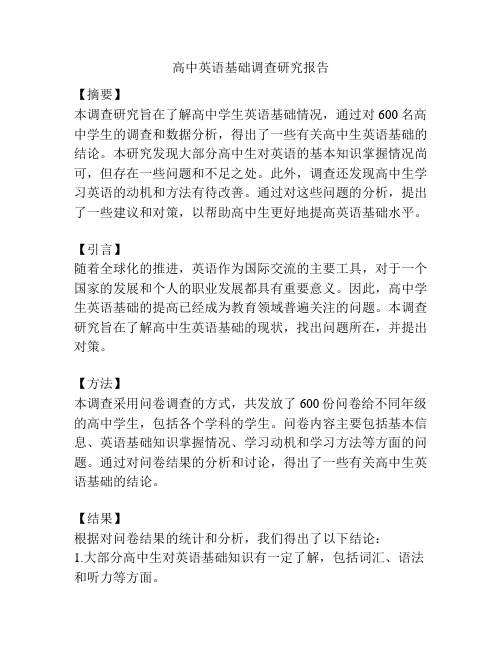
高中英语基础调查研究报告【摘要】本调查研究旨在了解高中学生英语基础情况,通过对600名高中学生的调查和数据分析,得出了一些有关高中生英语基础的结论。
本研究发现大部分高中生对英语的基本知识掌握情况尚可,但存在一些问题和不足之处。
此外,调查还发现高中生学习英语的动机和方法有待改善。
通过对这些问题的分析,提出了一些建议和对策,以帮助高中生更好地提高英语基础水平。
【引言】随着全球化的推进,英语作为国际交流的主要工具,对于一个国家的发展和个人的职业发展都具有重要意义。
因此,高中学生英语基础的提高已经成为教育领域普遍关注的问题。
本调查研究旨在了解高中生英语基础的现状,找出问题所在,并提出对策。
【方法】本调查采用问卷调查的方式,共发放了600份问卷给不同年级的高中学生,包括各个学科的学生。
问卷内容主要包括基本信息、英语基础知识掌握情况、学习动机和学习方法等方面的问题。
通过对问卷结果的分析和讨论,得出了一些有关高中生英语基础的结论。
【结果】根据对问卷结果的统计和分析,我们得出了以下结论:1.大部分高中生对英语基础知识有一定了解,包括词汇、语法和听力等方面。
2.部分学生对基本的语法和写作技巧掌握不够扎实,存在一些常见错误。
3.高中生在阅读和听力方面的水平相对较低,需要提高。
4.调查发现学生学习英语的动机主要是为了应对考试,而非真正的兴趣和提高交流能力。
5.学生学习英语的方法多样,但很多人缺乏有效的学习策略和系统性的学习。
【讨论】本调查结果反映了高中生英语基础存在的一些问题和挑战。
对此,我们认为以下措施可帮助高中生提高英语基础水平:1.加强英语基础知识的教学,注重语法和写作的扎实掌握。
2.增加学生的阅读和听力训练,提高听说能力。
3.培养学生对英语的兴趣和学习动机,建立正确的学习目标。
4.引导学生采用有效的学习方法,如多模式学习、创造性学习等。
5.增加英语学习资源和活动,提供更多的学习机会和平台。
【结论】通过本次调查研究,我们认识到高中生英语基础的重要性和存在的问题。
高级中学英语调查研究报告
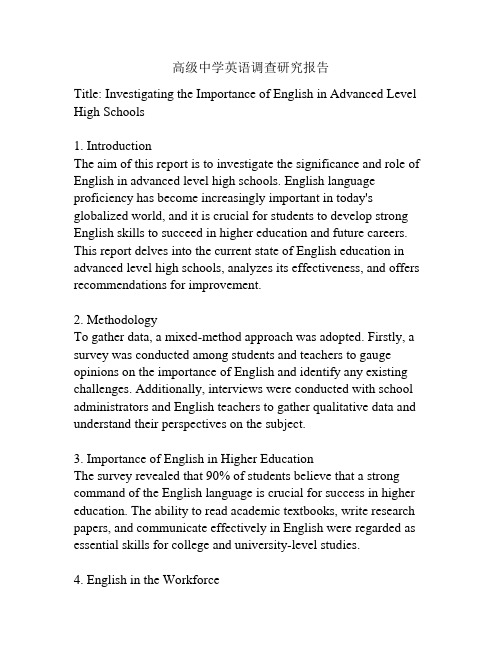
高级中学英语调查研究报告Title: Investigating the Importance of English in Advanced Level High Schools1. IntroductionThe aim of this report is to investigate the significance and role of English in advanced level high schools. English language proficiency has become increasingly important in today's globalized world, and it is crucial for students to develop strong English skills to succeed in higher education and future careers. This report delves into the current state of English education in advanced level high schools, analyzes its effectiveness, and offers recommendations for improvement.2. MethodologyTo gather data, a mixed-method approach was adopted. Firstly, a survey was conducted among students and teachers to gauge opinions on the importance of English and identify any existing challenges. Additionally, interviews were conducted with school administrators and English teachers to gather qualitative data and understand their perspectives on the subject.3. Importance of English in Higher EducationThe survey revealed that 90% of students believe that a strong command of the English language is crucial for success in higher education. The ability to read academic textbooks, write research papers, and communicate effectively in English were regarded as essential skills for college and university-level studies.4. English in the WorkforceThe majority of participants (80%) acknowledged that English proficiency greatly impacts career prospects, particularly in industries such as business, tourism, and international relations. The ability to communicate in English has become a requirement for many job positions, both domestically and internationally. 5. ChallengesThe report identified several challenges faced by advanced level high schools in teaching English. The lack of qualified English teachers, limited access to authentic English resources, and teaching methods that focus mainly on grammar and vocabulary were among the most common issues reported.6. Potential SolutionsTo address these challenges, the report suggests the following solutions:- Recruitment and Training of English Teachers: The schools should prioritize attracting and employing qualified English teachers who can effectively teach English language skills, focusing on communicative proficiency rather than just grammar rules.- Resource Enhancement: Schools should invest in authentic English resources such as books, movies, and online materials to expose students to real English language usage and develop their listening and reading comprehension.- Language Immersion Programs: Encourage immersion programs that provide students with opportunities to practice English inauthentic settings, such as study abroad programs and English camps.- Curriculum Revision: Schools should review and revise the English curriculum to ensure a balanced approach that covers all language skills (reading, writing, speaking, and listening) and incorporates real-world applications of English.- Supportive Learning Environment: Create a supportive learning environment that encourages active participation, collaboration, and critical thinking, promoting students' confidence and motivation to learn English.7. ConclusionEnglish proficiency is undeniably essential for success in higher education and the workforce. This report has highlighted the significance of English in advanced level high schools and recommended solutions to enhance the teaching and learning of the language. By implementing these recommendations, schools can better equip students with the necessary English language skills for future academic and professional endeavors.。
高中英语基础年级教学调查报告
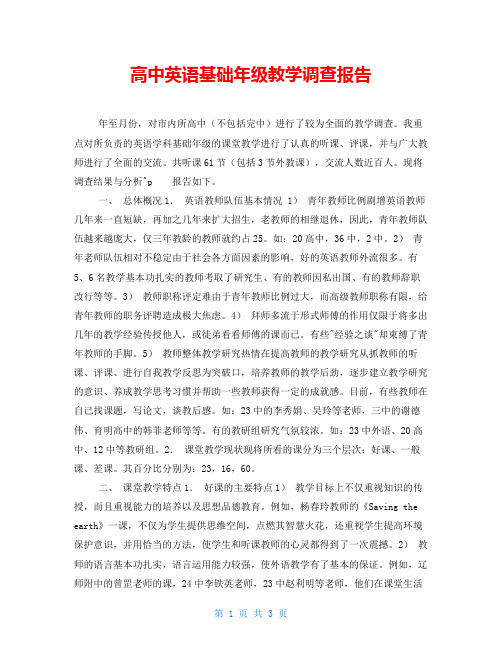
高中英语基础年级教学调查报告年至月份,对市内所高中(不包括完中)进行了较为全面的教学调查。
我重点对所负责的英语学科基础年级的课堂教学进行了认真的听课、评课,并与广大教师进行了全面的交流。
共听课61节(包括3节外教课),交流人数近百人。
现将调查结果与分析^p 报告如下。
一、总体概况1.英语教师队伍基本情况 1)青年教师比例剧增英语教师几年来一直短缺,再加之几年来扩大招生,老教师的相继退休,因此,青年教师队伍越来越庞大,仅三年教龄的教师就约占25。
如:20高中,36中,2中。
2)青年老师队伍相对不稳定由于社会各方面因素的影响,好的英语教师外流很多。
有5、6名教学基本功扎实的教师考取了研究生、有的教师因私出国、有的教师辞职改行等等。
3)教师职称评定难由于青年教师比例过大,而高级教师职称有限,给青年教师的职务评聘造成极大焦虑。
4)拜师多流于形式师傅的作用仅限于将多出几年的教学经验传授他人,或徒弟看看师傅的课而已。
有些"经验之谈"却束缚了青年教师的手脚。
5)教师整体教学研究热情在提高教师的教学研究从抓教师的听课、评课、进行自我教学反思为突破口,培养教师的教学后劲,逐步建立教学研究的意识、养成教学思考习惯并帮助一些教师获得一定的成就感。
目前,有些教师在自己找课题,写论文,谈教后感。
如:23中的李秀娟、吴玲等老师,三中的谢德伟、育明高中的韩菲老师等等。
有的教研组研究气氛较浓。
如:23中外语、20高中、12中等教研组。
2.课堂教学现状现将所看的课分为三个层次:好课、一般课、差课。
其百分比分别为:23,16,60。
二、课堂教学特点1.好课的主要特点1)教学目标上不仅重视知识的传授,而且重视能力的培养以及思想品德教育。
例如,杨春玲教师的《Saving the earth》一课,不仅为学生提供思维空间,点燃其智慧火花,还重视学生提高环境保护意识,并用恰当的方法,使学生和听课教师的心灵都得到了一次震撼。
高中英语教育调查报告3000字【高中英语基础年级教学调查报告】

高中英语教育调查报告3000字【高中英语基础年级教学调查报告】【摘要】:本报告通过对基础年级的高中英语教学进行调查,分析了教学过程中的问题和现状,并提出了相应的改进措施。
调查结果显示,学生对英语教学的兴趣不高,学习动力不足,缺乏有效的学习方法和策略。
在此基础上,本报告提出了培养学生英语学习兴趣的重要性,加强学习动机的激发,以及提供多样化、趣味化的教学方法和资源的建议。
同时,还呼吁学校和家长共同合作,为学生提供更好的英语学习环境和支持。
【关键词】:高中英语教学,基础年级,调查报告,学习兴趣,学习动机一、引言高中英语是中学阶段的一门重要课程,对学生的综合英语能力和学术水平的提升起着关键作用。
然而,在基础年级的英语教学中,存在着许多问题和挑战。
本报告旨在通过对基础年级的高中英语教育进行调查,分析教学过程中的问题和现状,并提出改进措施,以提高学生的学习兴趣和动力,推动高中英语教育的发展。
二、调查方法本次调查采用问卷调查的方式,共收集到100份有效问卷。
问卷的内容包括学生对英语学习兴趣的评价、学习动机的激发程度、学习方法和策略的运用情况等。
三、调查结果与分析1.学生对英语学习兴趣的评价调查结果显示,超过70%的学生对英语学习兴趣评价不高。
其中,有42%的学生表示对课堂内容不感兴趣,34%的学生表示学习英语对他们来说没有意义,21%的学生觉得英语学习很枯燥乏味。
这反映出学生对英语学习缺乏兴趣的问题比较严重,主要原因可能是缺乏趣味性和实用性的教学内容,以及对英语学习的认识和重要性的认知不足。
2.学习动机的激发程度调查结果显示,超过60%的学生对英语学习动机的激发程度不高。
其中,有38%的学生表示缺乏学习动力,27%的学生表示对英语学习没有明确的目标,23%的学生觉得英语学习压力太大。
这表明学生对英语学习动机的激发存在问题,需要采取相应的措施提高学生的学习动力和兴趣。
3.学习方法和策略的运用情况调查结果显示,大约80%的学生在英语学习过程中没有有效的学习方法和策略。
高三英语教学情况调查
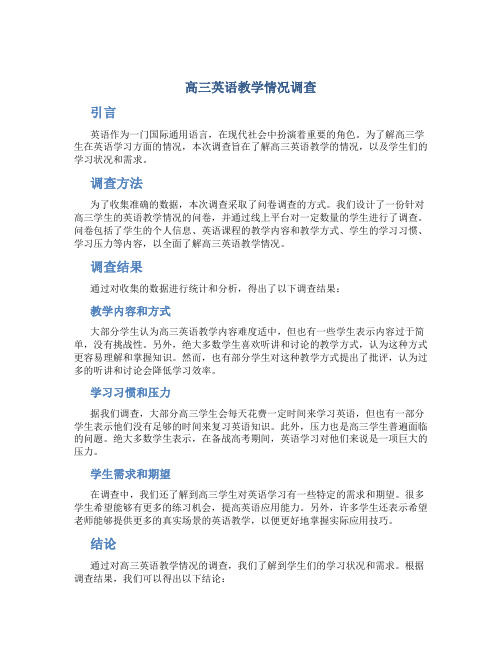
高三英语教学情况调查引言英语作为一门国际通用语言,在现代社会中扮演着重要的角色。
为了解高三学生在英语学习方面的情况,本次调查旨在了解高三英语教学的情况,以及学生们的学习状况和需求。
调查方法为了收集准确的数据,本次调查采取了问卷调查的方式。
我们设计了一份针对高三学生的英语教学情况的问卷,并通过线上平台对一定数量的学生进行了调查。
问卷包括了学生的个人信息、英语课程的教学内容和教学方式、学生的学习习惯、学习压力等内容,以全面了解高三英语教学情况。
调查结果通过对收集的数据进行统计和分析,得出了以下调查结果:教学内容和方式大部分学生认为高三英语教学内容难度适中,但也有一些学生表示内容过于简单,没有挑战性。
另外,绝大多数学生喜欢听讲和讨论的教学方式,认为这种方式更容易理解和掌握知识。
然而,也有部分学生对这种教学方式提出了批评,认为过多的听讲和讨论会降低学习效率。
学习习惯和压力据我们调查,大部分高三学生会每天花费一定时间来学习英语,但也有一部分学生表示他们没有足够的时间来复习英语知识。
此外,压力也是高三学生普遍面临的问题。
绝大多数学生表示,在备战高考期间,英语学习对他们来说是一项巨大的压力。
学生需求和期望在调查中,我们还了解到高三学生对英语学习有一些特定的需求和期望。
很多学生希望能够有更多的练习机会,提高英语应用能力。
另外,许多学生还表示希望老师能够提供更多的真实场景的英语教学,以便更好地掌握实际应用技巧。
结论通过对高三英语教学情况的调查,我们了解到学生们的学习状况和需求。
根据调查结果,我们可以得出以下结论:•教师在教学内容和方式上需根据学生的实际情况做出调整,既要考虑到内容的难度,又要照顾到学生的学习兴趣。
•学生学习英语需要有一定的习惯和规划,同时也要合理安排学习时间,分配好学习压力。
•针对学生的需求和期望,可以增加一些英语应用的练习,提供更多真实场景的学习机会,帮助学生提高英语实际运用能力。
综上所述,了解高三英语教学情况对于学校和教师来说是十分重要的。
- 1、下载文档前请自行甄别文档内容的完整性,平台不提供额外的编辑、内容补充、找答案等附加服务。
- 2、"仅部分预览"的文档,不可在线预览部分如存在完整性等问题,可反馈申请退款(可完整预览的文档不适用该条件!)。
- 3、如文档侵犯您的权益,请联系客服反馈,我们会尽快为您处理(人工客服工作时间:9:00-18:30)。
2020年高中英语教学调查报告一、问题的提出最近五年,我省高考英语平均分总在80分以下(总分为150分),而分值比重最大的阅读理解的平均分只有18分左右,及格率只在24%左右,极大地影响了考生英语成绩的提升。
从该大题的失分分析看出,我省中档题所占比例高于全国,而容易题比例却低于全国,全国所设置的容易题在我省变成了中档题。
也就是说我省高考英语阅读理解试题的难度较低,但学生的阅读理解率不高。
从近几年我省英语科高考阅读理解试题失分分析中看出:我省考生语篇意识较差,对文章的理解大多数只停留在词、句的浅表意义上,缺乏对文章的题材、体裁、主旨以及作者的写作观点和意图等深层意义的挖掘。
从近几年高考英语试题来看,高考命题已经愈来愈多地渗透语篇分析或语篇理论的思想,从听力测试到单项选择,再到完形填空、阅读理解和写作都离不开语篇分析的指导,特别是阅读理解中的7选5试题更加充分体现语篇思想。
从高中英语教学的现状来看,我们高中英语阅读教学任然过分重视词汇和语法知识的传授、讲解与记忆,忽视培养学生的语篇阅读能力,学生在平时的学习中,缺乏一定的语篇分析训练,教师在平时的教学中也缺乏对学生进行语篇分析的指导,以致造成学生在平时的学习中往往采取孤立割裂的死读硬背硬记的枯燥无味的学习方式,而且只是零碎的学习关于字、词、句、段、篇中的有关的语言知识,而不是从语篇的结构和功能如从衔接与连贯的角度上去把握词汇、句子、段落、篇章在表达语篇整体意义上所起的词汇衔接、语法衔接、文化背景图式的衔接、意义的衔接等所起的作用,以致于不能有效地加深对语篇的全面理解,导致英语教学费时低效,学生的听说读写等综合语言运用能力低,不能大面积提高英语教学质量,高考成绩不理想。
从考生全卷的失误分析中也可以看出我省中学英语在语篇教学上存在严重的问题。
因此,为了改变目前高中英语阅读教学的现状,走出英语教学的洼地,提高学生的阅读理解力,有必要尝试从语篇分析的视角来进行高中英语阅读教学,培养学生的语篇能力(mccarthy carter ,1994)。
为此,本课题所要研究的基本内容是:高中英语语篇阅读教学的基本内容和模式;语篇阅读教学所采取的方法和策略等。
重点主要从高考阅读理解题的命题原则、命题目的以及命题方向上训练学生如何对语篇进行整体解悟、如何提高学生接受信息和处理语篇信息的能力。
本研究的难点是怎样教会学生运用所学语法基础知识、基本的词汇量以及相关的背景图式,在阅读中获取所需的信息并与作者进行交互式的阅读,如何使学生走进作者的编码世界,准确地解码作者欲想传递的信息等。
本课题的研究假设是:语篇分析阅读教学能够提高学生的阅读理解力,从而促进学生的英语学习成绩成的提高。
二、文献综述1. 语篇语篇又称为篇章或话语等。
不同的语言学家有不同的表述,戴维克里斯特尔(XX:111112)认为,语篇指“一段大于句子的连续语言(特别是口语),……是一些话段的集合,构成各种可识别的言语事件。
……是人们语言互动过程中支配其行为表现的一个表达和理解的动态过程。
”;brown yule(XX:6)把text定义为交际事件的文字记录;hoey(1983) 把text定义为可清晰地表示一个或多个作者和一个或多个读者之间相当独立的、有目的互动,其中作者控制着互动并生产大部分或所有的语言(胡中曙,XX:28)。
halliday hasan(XX:1/XX:10)把语篇定义为使用中的语言,具有功能的语言,是语义单位;widdowson(XX:4)的定义是:语言的实际运用;唐青叶(XX)认为语篇没有大小和长短之分,表达一个完整的意义,具有明显的语篇特征,其主题意义相对完整,一脉相承,结构井然有序,功能相对独立,依赖于语境能完成一种可识辨的交际功能。
席晓青(XX)认为,语篇通常指一系列连续的语段或句子构成的语言整体。
也就是说,一切能够在一定的语境中发挥作用或实施一定功能的语段都可以看做是语篇。
李美霞(XX: 194195)将语篇界定为一种社会活动或社会过程。
有些语言学家认为语篇既指书面语言,又指口头语言; 有些则认为,语篇只指书面语言,不包括口头语言;有些试图把语篇和话语区别开来,用语篇指书面语言,用话语指口头语言。
我们赞同语篇或话语既指书面语言又指口头语言,是社会活动的中语言运用的基本单位,是运用语言进行交际的过程和结果,它依赖于一定情景,结构完整,表达一定的意图或意义或提供一定的信息。
但语篇并非都大于句子,有时候可以是一个词或句子。
语篇可长可短,一句问候、一个独白、一次谈话、一场论文答辩、一次讲话或演讲、一次记者招待会的问答以及一张便条、一份科研报告或诗歌、小说、散文等都是语篇。
只要所表达意义达到交际目的,哪怕是一个手势、符号或者图片也是语篇。
2. 语篇分析语篇分析是半个多世纪以来不断发展和兴盛的一门语言学新学科,至今已成为一个跨学科的综合性研究领域。
语篇分析又称话语分析(discourse analysis) 或语篇语言学或篇章语言学或篇章语法。
语篇分析最早源于布拉格学派的语篇分析思想(姜望琪,XX)。
discourse analysis 这一术语是美国结构主义语言学家哈里斯(z. s. harris)1952 年发表于美国《语言》(language)杂志的一篇题为“话语分析”的文章中首次使用的,而篇章语言学这一术语是德国语言学家weinrich 于1967年首先提出的,他认为任何语言研究都应以篇章为描写框架(刘辰诞,赵秀凤,XX:4)。
20世纪70年代longacre 等提出篇章语法(discourse grammar) 这一术语并认为语篇研究已经是语言学研究中不可或缺的一部分(姜望琪,XX:176)。
本文采用语篇分析这一术语。
对语篇分析的定义,学界也尚未形成统一的定论,但都公认语篇分析的中心任务是从结构和功能来研究语篇。
黄国文(1988:4)认为,语篇分析是指对比句子或话段更大语言单位所作的语言分析。
席晓青(XX:3)认为,语篇分析就是对语义连贯且有句际关系的话段或篇章的理解或解读。
语篇分析是一种多向度的思维方式,是基于语法分析的一种对语篇意义和结构进行合理的说明、解释和推断的活动和过程。
3. 语篇分析教学语篇分析对语言教学极为重要。
语篇分析教学就是运用语篇分析理论指导学生的语言学习活动。
近年来语篇分析教学受到越来越多的重视,成为教学法中不可分割的部分。
胡壮麟(XX)从组织课堂教学、阅读、写作、翻译、文体学和语法方面具体阐述了语篇分析在课堂教学中的应用和作用;常晨光(XX)分析了基于功能语言学的口语语篇分析在口语教学中的运用。
mccarthy carter(1994) 提出了“语言即语篇” 的语言观,主张语言、词汇和语法等语言要素共同构建语篇,即语言中的的词汇语法系统都是为构建语篇服务的,是语篇组织系统的重要组成部分。
程晓堂(201o:269)预言,基于语篇的语言教学途径将是未来语言教学的一个重要发展趋势,建议教师在语言教学中渗透语篇的教学,如分析语篇的结构、写作目的等,也就是说要积极研究、尝试基于语篇的语言教学途径,从语篇分析的视角进行语言教学。
席晓青(XX:认为,语言教学就是以语篇为中心,培养语言学习者在具体的社会文化语境中运用语言实施各种言语行为的能力。
由于国内外的研究只限于语篇知识介绍和分析研究,应用于教学也只限于大学英语教学,很少将语篇分析应用于基础教育课堂教学之中进行实证性的研究。
4. 语篇阅读教学阅读是对视角符号的一种积极主动的思维过程。
在这个 思维过程中,读者运用已有的知识经验和作者提供的已知信 息对语篇的未知信息进行识别和解码的,从而达到对语篇的 结构和功能的分析和理解。
随着语言学、心理学和信息技术 科学等的不断发展,英语阅读教学形成了不同的派别或模式, 主要有自下而上模式(信息加工模式)、自上而下模式( 语言模式)、图式理论模式和相互作用模式。
这些模式都有 一个的共同的局限,就是只涉及两个方面即视角符号和读者, 有的强调语言知识中的某些部分如词汇和语法,有的则强调 背景知识,忽略了语篇的生产者、语境、语篇的结构和功能 的关系、语篇的组篇机制等,导致阅读能力不能提高,阅读 理解率低。
语篇分析阅读模式努力吸收上述诸多模式的精华, 在凸显语篇意义或功能的基础上形成语篇结构和功能有机 统一。
简言之,语篇分析阅读就是读者运用语篇分析理论分 析如何在特定的语境和社会文化背景中理解作者的写作意 图及作者是如何依据自己的特殊身份组织语篇的即语篇的 组篇机制是什么,强调读者和作者及语篇之间的相互交际过 程。
语篇阅读的本质就是读者通过语篇,走进作者的情感世 界与作者进行积极主动的对话、交流和沟通的一交际活动。
阅读是基于语篇的阅读。
根据语言即语篇的观点,语言阅读 就是语篇阅读。
语篇阅读教学实际上就是语篇分析阅读教学, 主要是运用语篇分析理论指导阅读教学,通过师生、生生、 学生与语篇、学生与作者等的多极化互动体验活动,从而培 养学生的语篇分析阅读能力即语篇能力,提高19)心理阅读理解率。
由于高中生从心理上逐渐走向成熟,具有一定的分析判断能力,自主性不断形成,具备一定的英语语言知识和技能,在高中英语教学中建构符合高中生身心发展的交互式语篇阅读教学模式,探索一些行之有效的语篇教学新途径,大胆尝试语篇分析阅读教学可以改善教师的教与学生的学,促进学生语言学习能力的提高,这是必要而且是可行的。
因此,只有在平时的教学中从语篇的结构和功能如从衔接与连贯的角度加强对学生进行语篇分析指导,培养学生的语篇分析能力,才能提高学生的语篇阅读理解力,从而提高学生的高考阅读理解成绩。
三、研究方法1. 研究设计。
本研究采用非对等控制组前后测实验设计。
自变量为高英语语篇分析阅读教学,因变量为高学生英语阅读测验成绩与高考英语成绩。
2. 被试的选择。
所有被试均为贵州省毕节市一所普通高中高中高三年级同一个英语老师任教的两个自然班的学生,共计128人,并随机选定其中一个班为实验班,共68人;另一个班为对照班,共60人。
3. 教学方法。
本实验采用语篇分析阅读教学法,即在高中英语阅读教学中运用语篇分析作为实验干预手段。
在教学中,将语篇分析阅读教学法定义为:在阅读教学中运用语篇分析的理论或研究成果分析和解读语篇。
4. 教学效果的评价工具:(1)阅读方法调查问卷。
(2)访谈记录。
(3)阅读成绩测验。
(4)高考成绩。
5. 实验步骤:(1)准备阶段(XX年7月8月)。
①理论学习。
通过购买理论书籍,从知下载了大量的文献,认真学习了语篇分析的相关理论。
②设计问卷调查表。
本研究设计了两套调查问卷,各有21个问题,其中前18个问题为封闭性问题,后三个为开放性问题。
③设计前测和后测试题:本研究共设计了前测和后测试题各一套,满分为100分。
